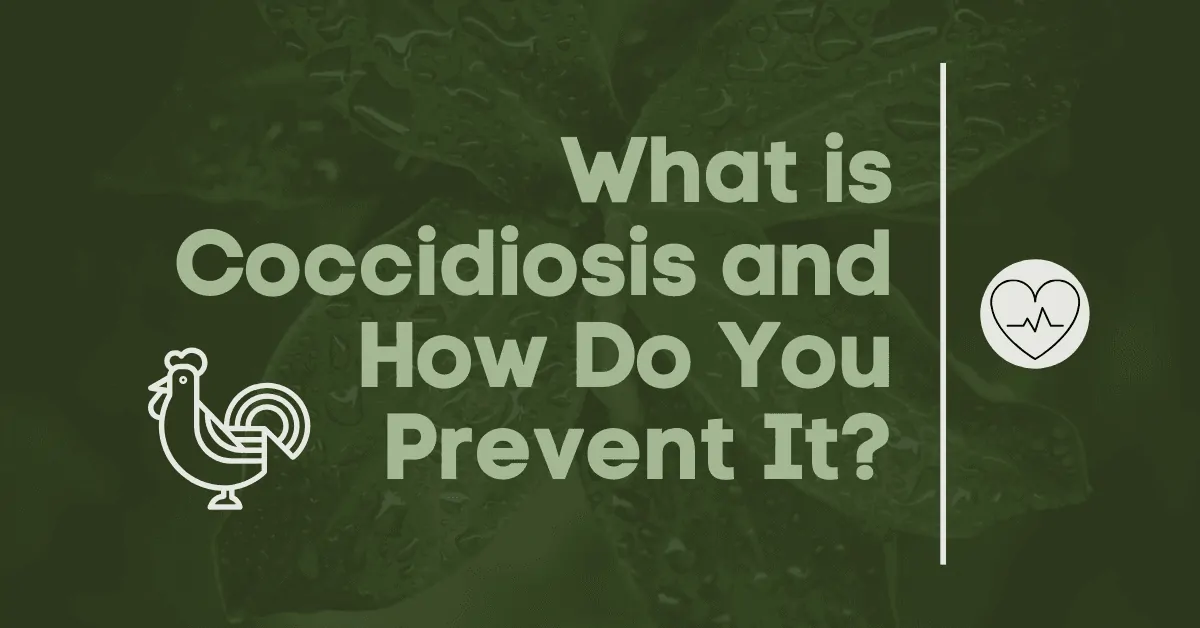Warmer months bring a higher risk for a deadly parasite called Coccidia. If you don’t know how to recognize and treat the parasite you need to learn fast if you don’t, it can mean a life-threatening situation for your entire flock.
What is coccidiosis in chickens? Coccidia is a deadly parasite that plagues a multitude of different species, not just chickens. Having your chickens’ contract coccidiosis can be fatal to your entire flock if not treated promptly. It can cause damage to their intense and lead to a multitude of different problems.
In this article, we will go over what you can do to prevent coccidiosis from destroying your flock, and how you can spot and treat it if it ever shows a face on your farm.
What is Coccidiosis?
Coccidia is found naturally in the environment, and there are hundreds of types of coccidia, that affect different species of animals. But all of them affect the intestines of its host.
Also, if you are curious about how to say the word it’s “kaak·si·dee·ow·suhs”.
Chickens have seven different coccidia species that can infect them.
If you want to know the technical description here it is:
“Coccidia is a subclass of microscopic, spore-forming, single-celled obligate intracellular parasites belonging to the apicomplexan class Conoidasida.” from Wikipedia.
In other words, coccidiosis is a parasitic disease of the intestinal tract of animals. Coccidian protozoa cause coccidiosis.
Coccidiosis spreads from one animal to another by contact with infected feces or by ingestion.
How Do You Prevent Coccidiosis in Chickens?
The first step is to make sure your chicken’s areas are dry and clean; this is essential in coccidian prevention. Just remember coccidia flourishes in dirty environments, especially if they are combined with warm temperatures and moisture.
Good hygiene is the first and foremost thing in coccidia outbreak prevention.
Every chicken coup and run contains trace amounts of this deadly parasite. It’s nearly impossible to prevent it entirely.
Coccidiosis is often spread by bringing infected birds into your flock.
Even with perfect cleanliness, an outbreak can still occur.
Still, drought, sunlight, ammonia, and freezing temperatures, will kill the parasite.
Chicks are highly susceptible to coccidia, it is the #1 killer of young chicks between 3-5 weeks of age, but adults can become infected as well.
The most common ways your chickens can become infected with coccidiosis is:
- Direct contact with the infected feces.
- Through drinking water that contains traces of feces.
- Wild birds can also introduce it into your flock.
Bottom line, keeping your chickens are clean will go along way with preventing this deadly condition.
How Can You Treat Coccidiosis?
Many flock keepers prefer medications to help prevent coccidiosis in their birds.
Corid is a common one added to drinking water; it contains the medication Amprolium, which can also be an additive to medicated chick starters.
Many prefer a natural method of prevention and to help boost immunity.
You can add apple cider vinegar (with The Mother) cinnamon, oregano, garlic, turmeric, green tea, and probiotic powder to their diet.
What Are the Symptoms of Coccidiosis
If your birds are showing a lack of life or being less active than usual this can be a first sign of Coccidiosis.
If you notice your birds are slowing down and are showing signs of diarrhea, ruffled feathers, poor appetite, lethargy, pale face/comb, and a scrunched stance, it’s a clear time to prepare to take immediate action.
Coccidia causes illness in chickens by attacking their intestinal lining. Coccidia causes diarrhea (sometimes bloody in severe cases, but not at all times). This can lead to dehydration and malnutrition, and eventually death if not caught early on and treated immediately.
In survivors, the damage to the intestinal lining can be permanent, and the bird may not grow or maintain body weight, or as an adult, it will always have a compromised immune system.
A chicken’s immunity derives from its intestines.
It can take up to 2 to 3 weeks after your chicks eat a coccida cyst before they will show signs of infection.
Mortality is very high in chicks, and death can occur in less than a week after the first symptom, fast treatment is a must!
Death can also occur in healthy adult birds if treatment is not given quickly.
Treatment of Coccidiosis
If your chicks or adults show any signs of coccidiosis, treat immediately!
Clean the brooder or coop top and bottom, dispose of all bedding and disinfect everything; empty feeders and waterers, then clean with a diluted bleach solution before adding Corid to their drinking water.
Treat the entire flock or group of chicks and carefully follow the directions on the label for Corid.
In summary
Coccidiosis is a horrible thing for any creature to go through.
It devastates the intestine tract, causes severe discomfort to your chickens, and worst of all can lead to their untimely death.
Prevention is the best treatment, but if your birds show any signs or symptoms, treat swiftly and clean everything.
If your birds do contract this deadly parasite, you need to move swiftly in treating them. Corid is an excellent solution for treatment and is not that expensive.
I highly recommend you have a bottle of Corid on hand just in case you are hit with this horrible parasite.
I pray that none of your flock ever has to go through this, it’s hard not only on them but will be hard on you as well. We have been through this and it’s not something we wish on anyone.
OhCluck.com is a participant in the Amazon Services LLC Associates Program, an affiliate advertising program designed to provide a means for sites to earn advertising fees by advertising and linking to Amazon.com
Comments
0 comments

